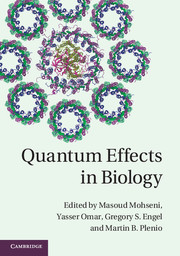Book contents
- Frontmatter
- Contents
- Foreword
- Contributors
- Preface
- Part I Introduction
- Part II Quantum effects in bacterial photosynthetic energy transfer
- Part III Quantum effects in higher organisms and applications
- 8 Excitation energy transfer and energy conversion in photosynthesis
- 9 Electron transfer in proteins
- 10 A chemical compass for bird navigation
- 11 Quantum biology of retinal
- 12 Quantum vibrational effects on sense of smell
- 13 A perspective on possible manifestations of entanglement in biological systems
- 14 Design and applications of bio-inspired quantum materials
- 15 Coherent excitons in carbon nanotubes
- References
- Index
13 - A perspective on possible manifestations of entanglement in biological systems
from Part III - Quantum effects in higher organisms and applications
Published online by Cambridge University Press: 05 August 2014
- Frontmatter
- Contents
- Foreword
- Contributors
- Preface
- Part I Introduction
- Part II Quantum effects in bacterial photosynthetic energy transfer
- Part III Quantum effects in higher organisms and applications
- 8 Excitation energy transfer and energy conversion in photosynthesis
- 9 Electron transfer in proteins
- 10 A chemical compass for bird navigation
- 11 Quantum biology of retinal
- 12 Quantum vibrational effects on sense of smell
- 13 A perspective on possible manifestations of entanglement in biological systems
- 14 Design and applications of bio-inspired quantum materials
- 15 Coherent excitons in carbon nanotubes
- References
- Index
Summary
Introduction
In this chapter, we will focus on the phenomenon of quantum entanglement. Entanglement is a special property that some states of two or more quantum particles may possess. When particles are in an entangled state they are correlated. But entanglement is far more than mere correlation. Entanglement is a type of correlation that macroscopic objects cannot have, even in principle; it is what we call a ‘non-local’ correlation.
Entanglement, and the non-locality that derives from it, is by now considered to be, arguably, the most important aspect of quantum mechanics. Philosophically it leads to many puzzles and to a complete change in our view of nature. At the same time, the practical implications of this type of correlation are very significant. In particular, they can lead to the dramatically enhanced information processing capabilities that quantum systems possess. The whole field of quantum information processing (Steane, 1998; Bennett and DiVincenzo, 2000; Zoller et al., 2005) has entanglement at its core.
Given the above, it is natural to ask whether biological systems make use and take advantage of the enhanced possibilities that entanglement offers. It seems natural to expect this, especially at biological molecular level, where the laws of quantum mechanics apply.
Entanglement between two isolated particles is easy to obtain: almost every time two particles interact they get entangled. But entanglement is very fragile. When two entangled quantum systems interact with a third, they easily become entangled in a tri-partite way; however, any entanglement between any two of them is reduced or disappears altogether.
- Type
- Chapter
- Information
- Quantum Effects in Biology , pp. 277 - 310Publisher: Cambridge University PressPrint publication year: 2014



